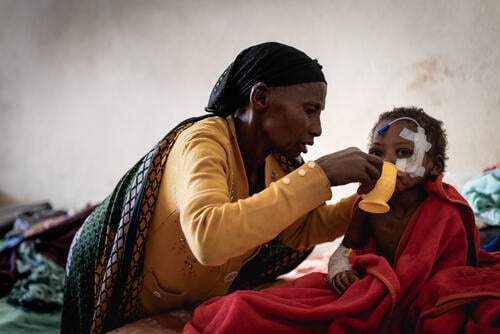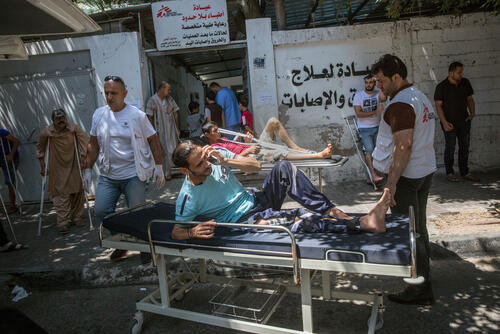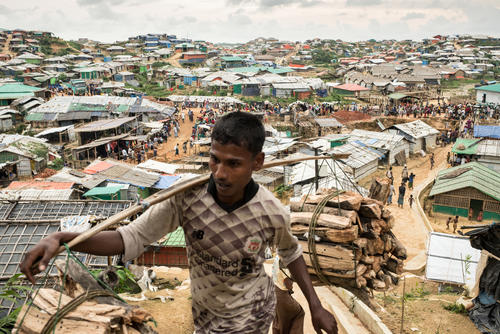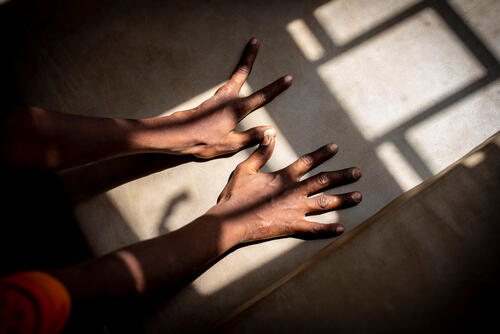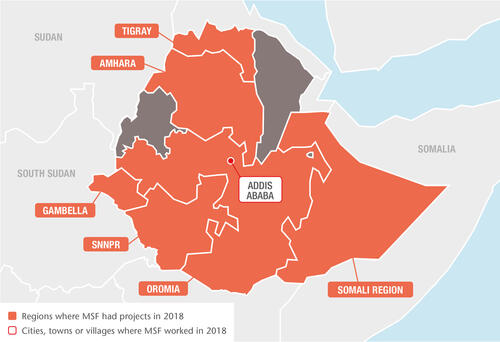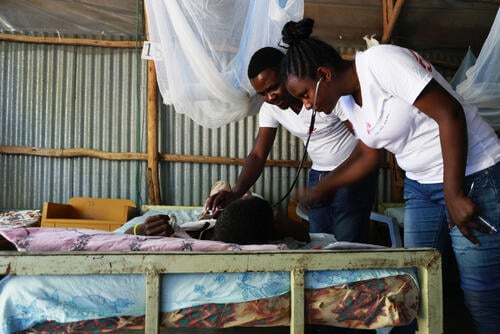
500,800
500,8
47,100
47,1
19,100
19,1

11,600
11,6
3,010
3,01
In addition to growing numbers of internally displaced people,<a href="https://reliefweb.int/report/ethiopia/ethiopia-humanitarian-response-situation-report-no19-november-2018">Ethiopia: Humanitarian Response Situation Report No.19 (November 2018)</a> Ethiopia hosts the second-highest number of refugees in Africa – more than 900,000 at the end of 2018, mostly from South Sudan, Somalia and Eritrea.
Médecins Sans Frontières (MSF) continues to fill gaps in healthcare and respond to emergencies affecting local communities, internally displaced people and refugees.
Emergency responses
In July, we launched one of our biggest emergency interventions of 2018 worldwide around Gedeo, SNNP region (SNNPR), and Guji, Oromia region, after an escalation in ethnic violence that left hundreds of thousands of displaced people without basic services.
When our teams arrived, people were living in cramped conditions, sleeping on the ground in vacant buildings, and suffering from diarrhoea, intestinal parasites and respiratory tract infections. We supported several hospitals, health centres, health posts and mobile clinics until the end of the year, when the crisis eased and we handed activities over to the local authorities.
Between July and December, we conducted nearly 91,000 outpatient consultations, treated around 3,000 children for severe acute malnutrition, and vaccinated 103,800 under-15-year-olds against measles in a preventive vaccination campaign organised in collaboration with the Regional Health Bureau in Gedeo. MSF staff also provided mental health support, treated victims of sexual violence, distributed essential relief items and trucked in 69 million litres of clean water.
In October, we launched another emergency intervention to respond to the needs of people displaced by violence in East Wellega on the border between Benishangul-Gumuz and Oromia regions. Our teams focused on emergency healthcare, water and sanitation, and at the end of the year, expanded these operations to neighbouring West Wellega.
Gambella region
In 2018, we increased our support to Gambella hospital, the only facility in the region offering specialised medical care for a population of 800,000, half of them refugees from South Sudan. Our teams worked in the emergency room, operating theatre and surgical inpatient unit and assisted 2,820 births. We maintained our focus on neonatology and maternity services to reduce the high maternal and child mortality rates.
We also worked with the Ethiopian authorities in Kule, Nguenyyiel and Tierkidi refugee camps, which together provide shelter for around 200,000 South Sudanese refugees,United Nations refugee agency, UNHCR as well as in Pamdong reception centre. Teams worked in a health centre, a 24-hour maternity unit and six health posts, offering most medical services including support to victims of sexual violence, and referrals for surgery to Gambella hospital.
Tigray region
The signing of the Ethiopia–Eritrea peace deal in July and the opening of the border on 11 September led to an influx of Eritreans claiming asylum, mainly women and children. We provide both inpatient and outpatient psychiatric and mental health services to Eritrean refugees in two camps and to the local communities. Many of our Eritrean patients reported traumatising experiences at home, on their journeys to Ethiopia and in the camps.
Amhara region
Our focus in and around the town of Abdurafi is the treatment, diagnosis and prevention of kala azar (visceral leishmaniasis) and snakebites, two deadly but neglected tropical diseases. In 2018, the teams in our clinic treated 647 patients for snakebites, and 369 for kala azar. We have been carrying out research on kala azar in Abdurafi since 2002, in conjunction with the Institute of Tropical Medicine Antwerp, the University of Gondar and the Ethiopian Public Health Institute, seeking to develop better treatment methods for complicated cases and better prevention methods. The team is also trying to find a more effective snakebite treatment.
Somali region
We have had teams working in Dolo town, Liben zone, on the border with Somalia, since 1995. The health centre in Dolo Ado offers basic healthcare to the local community and people who have fled violence and food insecurity in Somalia and settled in five camps in the zone. We also treat many Somali nationals who cross the border in search of medical care. At the end of the year, we handed over all our activities at the health centre to the health authorities, except for maternity and obstetric care.
We also handed over our medical activities at Wardher hospital and the district health centres in Danod and Lahel-Yucub in Doolo zone to the Regional Health Bureau at the end of the year. Since 2007, we had been supporting outpatient and inpatient services, water and sanitation activities and emergency referrals. We maintained and ran isolation wards during disease outbreaks, assisted deliveries and provided antenatal care, treatment for tuberculosis and for severe acute malnutrition in children under five.
We have also been offering comprehensive primary healthcare through mobile clinics in more than 10 locations in Doolo zone for children under the age of 15 and pregnant and lactating women. Our plan is to expand these mobile activities to provide care for all ages, as well as surveillance of emerging disease outbreaks, community engagement and health promotion, covering a wider area to reach more people, including the nomadic pastoralist communities.
Deported migrants
Since November 2017, the Kingdom of Saudi Arabia has been forcibly expelling migrants living irregularly on its territory. An average of 10,000 Ethiopians are deported each month, with chartered planes arriving weekly in Addis Ababa, according to the International Organization for Migration. We started providing medical and mental health screening and support in the airport and at a centre in the city in March. Despite the trauma most of our patients had experienced, many tried to make the perilous Red Sea crossing back to Saudi Arabia.



